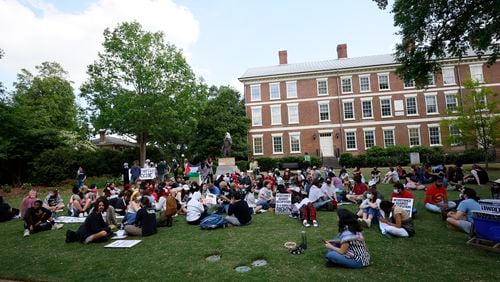On March 22, droves of fans covered in glitter and body paint swarmed Miami’s Bayfront Park to attend the first day of the Ultra EDM Music Festival.
Then the downpour started.
Buckets of rain assaulted poncho-clad attendees as they sloshed through ankle-deep flooding and sludge, though some voluntarily played around in the mud instead, John Furey, a 27-year-old festival-goer, told me over email. For a while, the audience continued to bump their fists to well-known DJ Tiësto’s set in tandem with the water pounding around them.
But eventually, the severe weather forced organizers to cut this day of the festival short.
“The rain just became relentless,” Furey recalled. “Without music we were left with our thoughts and conversations of whether the festival goes on and sure enough the weather advisory and announcement came over the sound system which was crushing but not surprising.”
Over the past few years, concert attendees have increasingly faced the elements while attending outdoor shows, sometimes with grave consequences.
Last May, almost 100 people at a concert for musician Louis Tomlinson were injured in a hailstorm in Colorado. A few months later, more than a dozen people at the Ed Sheeran concert in Pittsburgh were taken to the hospital, several for heat-related illnesses. The problem reached an apex in November, when a 23-year-old fainted at a Taylor Swift concert during a heat wave in Brazil, and died a few hours later due to heat exhaustion, reports the Associated Press.
Research shows that climate change is making extreme weather events like these more common and severe, which could put fans at concerts, sports games and other outdoor events at higher risk, experts say.
Soundtrack for disaster
After following the string of weather-related concert disruptions in the U.S. over the past few years, crowd safety researcher Milad Haghani decided to see if this trend could be seen in Australia, as well.
He analyzed news reports over 2022 and 2023 and found that at least 22 music festivals were canceled or disrupted as a result of extreme weather. By comparison, only 10 music festivals in the country were impacted by severe weather between 2013 and 2019.
“I think it’s very clear that it’s happening at an increasing rate, and the severity of the events, the impact of the events are more tangible now,” Haghani, a senior lecturer at Australia’s University of New South Wales, told me over the phone.
However, the most severe public health risks arise when an outdoor event isn’t canceled during heat waves or floods. The environment at a music festival or concert can pose particularly tough challenges for public safety during extreme weather because shelters vary across venues and there tend to be higher instances of recreational use of drugs such as MDMA, which can increase a person’s risk of severe heat stress, Haghani said.
Event organizers are also starting to recognize the increasing threat from rising global temperatures, reports Context.
“We know that with the climatic changes we are living through, these episodes will be more frequent,” Serafim Abreu, chief executive of entertainment company T4F, which organized the Taylor Swift show in Brazil, said in a video after the event. “We also know that every sector must rethink its actions in the light of this new reality.”
Communication is key
Not all weather-related concert cancellations are a result of climate change. But a growing body of research predicts extreme weather events will become more intense as global temperatures warm, and event organizers must be better prepared, Haghani said.
“One of the responsibilities of the organizer is to make hydration accessible to people,” he said. “I think that is one of the key factors and easy fixes.”
Haghani added that another way to prepare concert attendees for extreme weather is through clear and detailed communication from event staff about conditions such as the temperature, humidity, potential health effects and the demographics most at risk on a given day.
At an infrastructure level, experts say that venues can plant more trees for shade, install misting stations to mitigate heat impacts and expand covered areas where concert attendees can shelter during severe weather like the rainstorm that hit Miami’s Ultra.
“We need a meteorologist who can advise the event staff on cooling stations, the amount of water to have available, [and] where are the most likely places in your venue that will get excessively hot,” Kevin Kloesel, an event safety meteorologist for the University of Oklahoma, told Context.
Music’s climate footprint
The music industry contributes its own share of emissions that are fueling extreme weather, which come largely from transportation to and from the event and the venue’s energy-guzzling sound and light systems.
But some festivals are working to “go green” by banning single-use plastics, promoting public transportation and offsetting their emissions through tree planting, reports The New York Times. The bigger impact from these actions could come from exposing large audiences to climate solutions, similar to the Super Bowl’s embrace of clean energy, which I wrote about in February.
“These electronic music festivals are drivers of culture change,” Heather White, an environmental scientist and founder of the nonprofit One Green Thing, told the Times. “We have to have these living laboratories, where people can see zero waste at a concert, because without culture change, big policy solutions are not going to work.”
Credit: contributed
Credit: contributed
MEET OUR PARTNER
This article comes from our partner Inside Climate News, the Pulitzer prize-winning nonprofit, independent news organization that covers climate, energy and the environment. Sign up for their newsletter here.
If you have any feedback or questions about our partnerships, you can contact Senior Manager of Partnerships Nicole Williams via email at nicole.williams@ajc.com.







